Lessons from Liberia: Integrating Theatre for Development and Youth Development in Uncertain Times
Each time I leave Liberia, I tell my research partners that I’ll see them again soon. The response is always, “God willing.” This faith-filled statement stands as a reminder of the uncertainty that characterizes all of life, though the precarious nature of the day-to-day is more apparent in some places than others. - Jasmine Blanks Jones

COVID-19 Conversation, a short film by Hannah McKay (Liberia)
COVID-19 has in many ways been the great equalizer, laying bare the poor outcomes in health and education for BIPOC in places such as the United States that many consider to be a “developed” country despite yielding some of the greatest disparities. African countries have fared much better than most of the so-called developed world in managing COVID prevention due to protocols put in place in response to the Ebola virus epidemic in 2014-15. The fear of COVID transmission in March of this year is reminiscent of the fear of Ebola just a few years earlier, which felt like the uncertainty and precarity of the civil war in Liberia just a decade prior to that. This recurring feeling, once recognized, propelled young theatre-makers to action as citizens in each crisis.
In the years preceding the Ebola crisis, Burning Barriers Building Bridges Youth Theatre (B4YT), a US 501c3 and a Liberian local NGO with headquarters in Maryland, USA and Gbarnga City, Liberia, trained hundreds of young people and subsequently reached 300k people through street theatre during the Ebola crisis. Their health promotion and wellness messaging focused on prevention awareness measures such as washing your hands, not touching people with signs or symptoms of Ebola, and other best practices. The youth theatre artists’ use of dialogical performance contributed to critical knowledge which iteratively informed interventions throughout their awareness campaign (Blanks Jones, 2015).
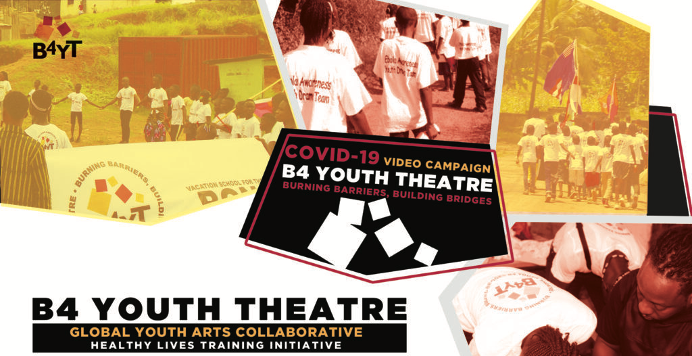 With a mission of empowering young people to become educated citizens through the arts, the organization has expanded its programming through virtual theatre and filmmaking to address the underlying causes of COVID-19 and to add youth voices in the US and Liberia to global discussions on practice and policy that impacts the wellbeing of their communities.
With a mission of empowering young people to become educated citizens through the arts, the organization has expanded its programming through virtual theatre and filmmaking to address the underlying causes of COVID-19 and to add youth voices in the US and Liberia to global discussions on practice and policy that impacts the wellbeing of their communities.
Through this process, we have learned how as an organization to consistently and ongoingly develop, reassess, and reframe messaging in accordance with emergent community needs and in collaboration with leading public health and education organizations across Liberia. Lessons from these youth theatre practitioners were shared with US-based youth of color in Baltimore, Atlanta and Connecticut to lift underrepresented perspectives in health policy and local issues, initiate effective discussions within local communities, and share lessons learned with a global audience.

Photo from short film, Kenneth Rice (USA) and COVID-19 based off of his experiences facing social isolation
Through this culturally responsive Global Youth Arts Collaborative for Healthy Lives Training Initiative (GYAC), youth artists created family-theatre productions that were disseminated as short films on online platforms. Though our original aim was to give young people in the United States and Liberia a platform to raise up their voices on the health disparities underlying COVID-19, when the US-based youth took the stage, the issues they presented spanned a wider range of social determinants of health, many of which align directly with the United Nations’ Sustainable Development Goals (United Nations, n.d.). The SDGs are rarely centered in US education and health policy. Pre-COVID, issues that would be considered in the purview of the SDGs or development-centered concerns such as pervasive hunger, the technology gap, and other inequalities were largely ignored in the US context.
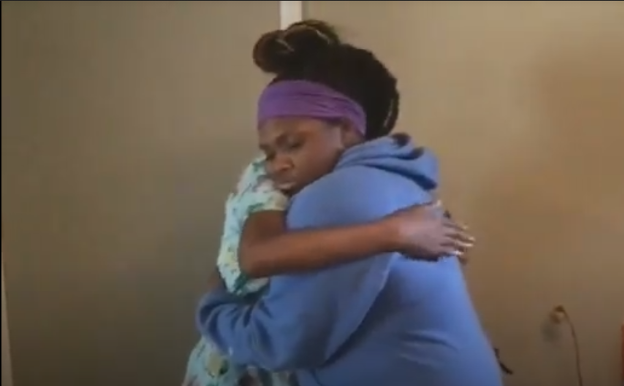
Out, a short film by Malaya Wiggins about role models and peer pressure
Now it is apparent that the structural and systemic issues that undergird poor health and education outcomes globally also exist in the US, particularly for BIPOC as US school districts and communities scrambled to make sure children had access to food who relied on school breakfast and lunch and still struggle to provide adequate technological devices and internet access for virtual schooling. It was striking to see the commonalities across seemingly disparate communities, one being a “developing” context and the other often considered one of the most “developed” in the world. This highlighted that development challenges have common root causes, which are interconnected and cannot be separately dealt with, and that resolutions to these challenges should take a holistic approach to effectively address them and truly make an impactful difference. We asked our research team of staff and MPH interns the following question: have COVID-19 and the parallel racial violence pandemic created room for troubling the term “development” and its implications for the way health and education interventions engage with youth communities of color on a global scale? Our initial findings from this participatory, comparative case study demonstrated strong synergies between how youth in both the US and Liberia identified the major problems impacting their quality of life and the wellbeing of their communities. The youth participants identified social isolation, hunger, COVID-19 prevention, positive role models/ peer pressure and anti- black police brutality as the most important issues impacting young people in the US today. In Liberia, the key issues identified were COVID-19 prevention, the importance of contact tracing, and inequitable access to medication with price inflation.
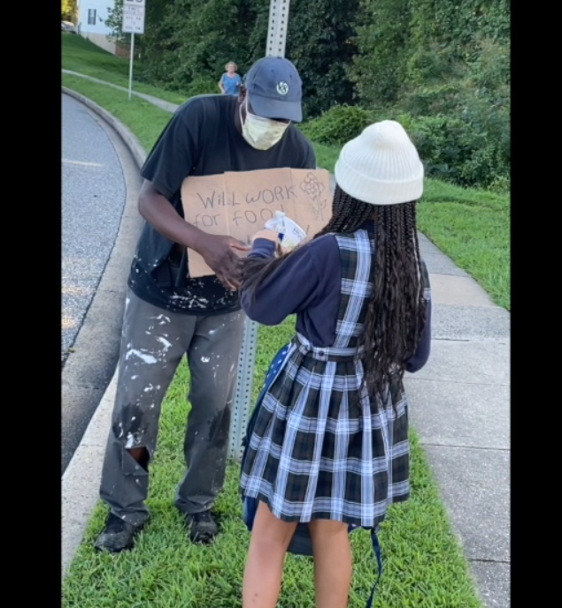
Photo captured from Feeding One Person at a Time, short film by Courtney Gray, USA
According to the April 14th World Health Organization’s COVID-19 Strategy Update, communities must be “fully educated, engaged and empowered to live under a new normal,” requiring a shift in perception of the virus and a shift in the culture of health (World Health Organization, 2020). We examined the unique role that youth artists can play in cultural level intervening to rapidly disseminate information, initiate effective discussions within their local communities while sharing information virtually with a global audience, and further civic trust to delicately create messages around community concerns. In response to these joint pandemics, the GYAC provided young people in Liberia and the United States with the performance, production and filmmaking skills needed to address important global health issues. Through this year’s GYAC, four short films were selected for the closing watch party debut which highlighted topics deeply rooted in social and structural inequality: hunger, police brutality, role models and peer pressure, and COVID prevention. Aligned with the United Nations’ 2030 Agenda for Sustainable Development in the topics of “Good Health & Well-Being” and “Reduced Inequalities” (United Nations, n.d.), the young people created these family-theatre productions in response to the question: What is the biggest issue impacting the health of young people today?
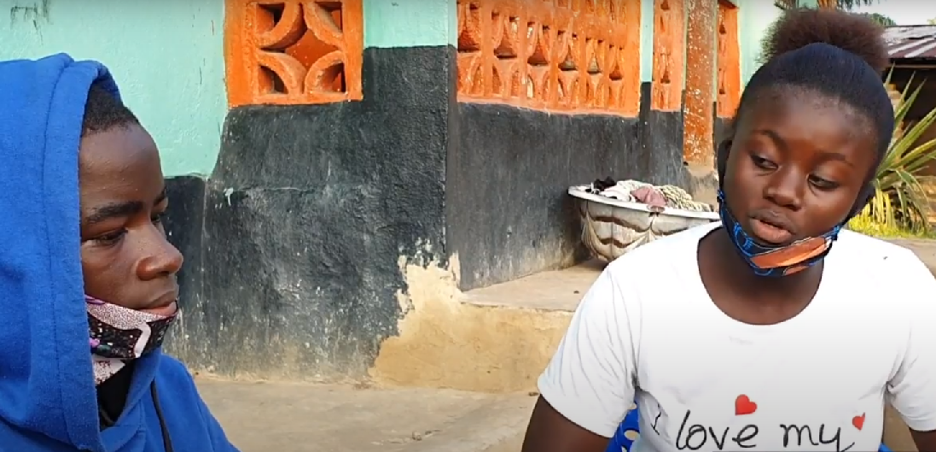
Why Patients Die Sometimes? a short film by Cecelia Wesseh (Liberia)
Taking the lead from the youth, GYAC has expanded its scope to include these broader issues of public health to support students’ understanding of the underlying systemic racism and racial biases that serve to create and sustain health disparities. Serving as ambassadors, youth artists reached out to their respective communities with a tailored online survey for an issues summit exercise as a part of the program evaluation process. As a result, we collectively learned that communities must have access to resources, recognize health as a shared value, promote active participation of all sectors at every level to deliver inclusive, quality healthcare services, and empower people to lead healthy lives.
Through performance art, the youth artists incorporated this knowledge to strategically develop stories that advocate cross-sector collaboration, build grassroots-based communal trust, and advocate change. Arts-based pedagogies empower youth to identify their own communities’ problems and offer their own solutions rooted in research and lived experiences, helping communities make well-informed decisions (Rogers, 2017). For example, one video focused on a discussion of Black traditions of resistance to discrimination between a father and son, which led to their activism as a form of youth social justice identity development. The solution to police brutality posed in this film was to foster learning within families about culturally relevant traditions of resistance so that young people understand the central role of advocacy in creating change. Through the GYAC, youth concerns were also shared with a global virtual audience via a public watch party and social media outlets, highlighting issues that Black communities face worldwide in times of crisis. With these mechanisms in addition to a developed policy brief in association with the initiative, we hope to initiate discussions among decision-makers in the near future to prioritize equitable public health.
Youth development in the context of this program included families and their broader networks. As artists, it also included the publics who viewed and responded to their work, which is why surveying communities ahead of creating theatre-based work is central to the theatre for development model. Returns to the community, in this case through virtual space, is equally important in evaluating the effectiveness of messaging (Nwadigwe, 2012). Post-performance discussion and follow-up is central to the Theatre for Development approach, which differentiates TfD from other forms of communication for development. These final steps allow for participatory evaluation, exchange of information and ideas as transitioning this approach to a virtual space requires new tools. By reaching out to audiences directly on Facebook about the youth artists’ short films using a tailored AI-based chatbot as a remote evaluation tool, this project assesses the breadth and type of audience interactions alongside the videos’ overall impact in their communities using language, emoticons, and gifs designed to engage the viewer. This is the second phase of the project which is currently underway.

Photo captured from Magic Boyd’s (USA) short film, No Justice No Peace.
In this way, development is not a straight path with some communities ahead and others behind. Rather, as the world is drawn together through communications and media such as theatre and film, development is an iterative process which includes intergenerational and intercultural learning and sharing, drawing on cultural traditions that promote collaboration for the advancement of equitable solutions in health and education. This truth is once again revealed with COVID-19, like during the Ebola crisis, in which the world is now required to reconsider their approach towards health and education disparities as well as any other development challenges. With this understanding and considering the nature of coronavirus, B4YT expanded GYAC’s scope of reach to virtual space with use of technology, unlike during the Ebola crisis where community messaging was limited to physical locations of street performances by youth artists. This expansion not only connected individuals of different nationalities and cultural backgrounds from various locations in creating community-based messages but also lifted barriers in sharing them to a greater number of audiences. The lessons acquired from this project underlined that integration of bottom-up approach in community messaging rather than top-down approach along with usage of technology is important and required in times of crisis to promote sustainable development. While the US is struggling to address COVID prevention to reach a new normal, there is an opportunity to learn from the challenges and successes of navigating recent epidemics in other parts of the world. Raising the examples of youth and grassroots organizations in Africa which have made substantial contributions to health promotion and wellness is one step in the necessary direction of citizen empowerment at the cultural level that drives improved health.
View the videos! https://sites.google.com/gwmail.gwu.edu/gyachlti-2020/gyachlti-final-films
Jasmine L. Blanks Jones is a Ph.D. Candidate in education and Africana Studies at the University of Pennsylvania and a Health Policy Research Scholar with Robert Wood Johnson Foundation. As Founder and Executive Director of B4 Youth Theatre, she collaborates with the organization’s staff and students as research partners in the areas of education, health, advocacy, gender and racial equity.
Jocelyn Cordell is the International Programs Director at B4 Youth Theatre. A former United Nations Association (UNA-NCA) Graduate Fellow, she received her M.A. in International Affairs focusing on conflict resolution from George Washington University’s Elliott School of International Affairs. A classical vocalist with 10+ years of arts education experience, she has been managing programs for the Theatre since 2017, bringing an expertise in peacebuilding and intersectional youth programming.
Joanne Y. Chang received her M.A. in International Affairs from the George Washington University, Elliott School of International Affairs, with a focus on conflict resolution and international development. After spending three years in the South Korean education system and one year in the humanitarian sector, Ms. Chang currently serves as the International Development Program Assistant at B4 Youth Theatre.
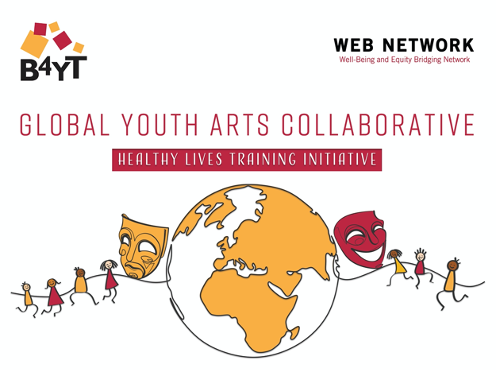
Blanks Jones, J. (2019). Flipping the panopticon: Liberian youth break the fourth wall in the Ebola crisis. In A. Rapoport (Ed.), Competing frameworks: global and national in citizenship education (pp. 137-166). Purdue University.
Nwadigwe, C. E. (2012). Theatre for development: an alternative programme for reproductive health communication in urban Nigeria. African Sociological Review/Revue Africaine de Sociologie, 16(2), 102-118.
Rogers, V. (2017, February 1). How the arts inform and engage—and energize—our communities. Knight Foundation. https://knightfoundation.org/articles/the-view-from-the-knight-arts-program-how-the-arts-inform-and-engage-and-energize-our-communities/
United Nations. (n.d.). About the Sustainable Development Goals. United Nations Sustainable Development. Retrieved from https://rb.gy/e8hoe5
World Health Organization. (2020). COVID‑19 strategy update - 14 April 2020. https://www.who.int/publications/i/item/covid-19-strategy-update---14-april-2020





